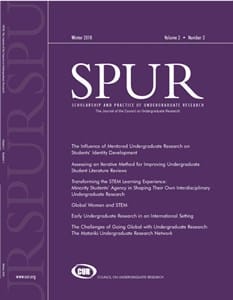SPUR (2018) 2 (2): https://doi.org/10.18833/spur/2/2/1
This article presents the results of an investigation into undergraduate students’ perceptions of the influences of their mentored research experiences on their identity development. Data from a 2015 survey were analyzed using summative and inductive approaches. The results indicated that participants had access to multiple opportunities for mentored undergraduate research. Second, participants identified a constellation of mentor types that facilitated students’ initial and long-term engagement in undergraduate research experiences. The inductive analysis of openended responses uncovered five categories of elements identified by participants as influencing their identity shifts and three domains of students’ perceived identity shifts: disciplinary/professional, academic/researcher, and personal/cultural. The findings extend the literature related to outcomes of mentored undergraduate research and suggest a need for additional investigations into mentoring models that accommodate arrays of mentors and identity shifts associated with mentored undergraduate research.
More Articles in this Issue
No posts found


